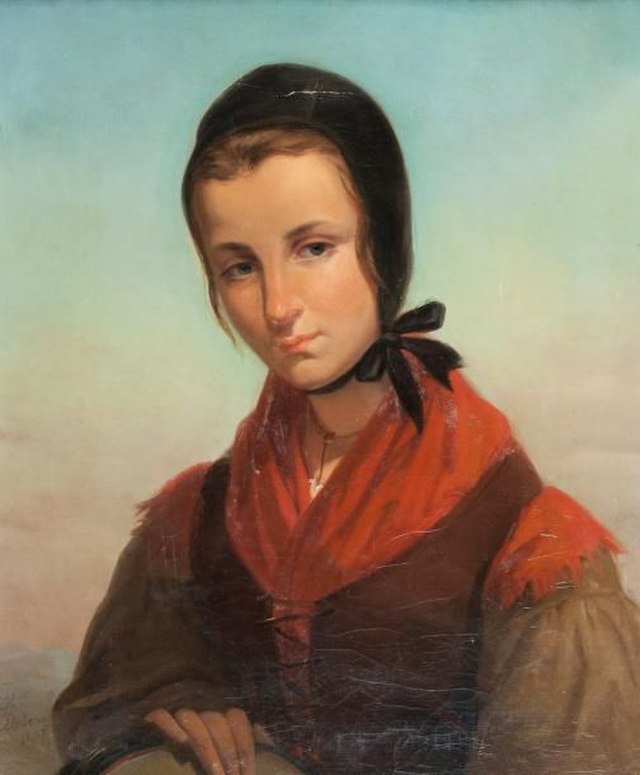Content warnings for this story (click here for guide):

Three Years Later
“Rosie!” hissed the younger girl. “What are you doing?”
“Oh, come on Hannah,” said her sister. “It’s dead out here. Nobody’s going to see us. I’m sweltering!”
Rosie, a tall girl of 18, fiddled with the knot at the back of her dingy grey headscarf. The dirty cloth covered every scrap of her hair. Her sister, who was nearly 15, wore an identical rag on her head. It was hot outside and her sweaty fingers struggled with the rough fabric, but eventually the cloth came undone, and she sighed at the light breeze as it combed her hair.
The Carbaston market square, once bustling with activity, chatter, music and friendship, had itself become a grey, flat thing. Trade still took place, but quietly, solemnly and joylessly, with an eye always to who might be watching.
The levy on local sales was great and the tax enforcers merciless. Anyone caught withholding the lord’s share could expect a whipping and a penalty fine. Lord Deveraux had also established a bounty system for those reporting monetary crimes, which turned old grudges into furtive tip-offs, most of which were taken as true. Since the tax burden took food from their children’s mouths, even the most kindly villagers were tempted to tell on their neighbours, for a few pieces of silver.
But Deveraux himself was not the only tyrant. His wife, Lady Beatrice, had embraced her newfound power over her former neighbours, especially the women. She had always been a sour girl, sick of working as a dairy farmhand, indignant at her lot and envious of others’ happiness. Now, at last, she had them all in her pocket, and in her three years ruling over them, she had introduced a few new rules. These included all marrriages needing her approval (a useful way of acquiring gifts and tributes, and a cruel form of sport when she chose to refuse), certain colours of cloth being off-limits to commoners (on pain of public exhibition in the stocks) and a ban on any criticism of her (her soldiers were encouraged to use their discretion to stop the mouths of offenders).
A particularly sadistic punishment Lady Devereaux enjoyed was to have any unreasonably pretty young women rolled in manure and prevented from going near the river for a week. Stinking and ashamed, they would shuffle around town in disgrace, shunned and ridiculed long after they were finally allowed to wash themselves.
One of Lady Devereaux’s rules, however, was to prove her undoing.
A decent-looking girl who enjoyed attention, Beatrice Streeter had always resented her father’s insistence that she bind up her hair for work. It was decent and modest, he said, and practical for her labour. She was not to get airs, nor to think herself a prize. When she had protested that even the other farm girls wore their hair flowing and free, her father had yanked her scarf tighter, called her a little slut and whipped her back to work.
“Nobody marries a preening little whore!” he’d yelled.
The strict orders and strappings hadn’t stopped Beatrice flirting with boys behind her father’s back, and indeed, she had the last laugh, for she had married the most powerful man in the land, precisely by being a preening little whore. After her marriage, she wore her hair loose every day, peppering it with pearls and precious stones.
After Lord Deveraux hiked the taxes, Beatrice’s father came to her and asked for clemency. His business was suffering and he could not afford the payments. These taxes would ruin him and force him to sell his cattle.
Beatrice simply laughed in his face. “Oh dear,” she said, tossing her curled mane. “That will be terrible, won’t it? But I’m afraid I can’t help you if you’re simply bad with money. You peasants never learn, do you?”
Her father growled at the insult. “You may wear silks now, my girl, but you’re no queen. I ought to whip you for treating your father this way.”
That night, every one of John Streeter’s cows disappeared. A note was left, explaining that they had been sold to pay his debts. Streeter himself, in despair, left for a new town, to find work as a labourer.
Shortly after this, a new rule was posted in the town. All women and girls over 16 were to cover their hair as a mark of respect and loyalty to Lady Deveraux. A basket of dull grey rags was left in the market square and it was made clear that any peasant woman disobeying the rule would suffer greatly.
“Any woman with uncovered head must demonstrate her respectability with jewelled decorations,” read the proclamation. “Those found with bare head or gaudy scarf and no jewels will be assumed whores and given appropriate work.”
There had of course been rebels. The carpenter’s daughter Isobel refused to take a grey rag and went about her business as usual. She was stopped on her delivery route and questioned by Deveraux’s men.
“Oh do get away,” she tried to bustle past. “I am not looking for a man. I simply won’t wear a privy-cleaner on my head for Beatrice Streeter’s amusement!”
The soldiers grinned and gripped her by the arms. They bent her over the well and lifted her skirts as she screamed blue murder. As she struggled and people came out of their houses to look, the men took down her underthings and applied a horse crop to her bottom.
“Hey! Stop that!” began the local publican, whereupon one of the men bludgeoned him to the floor. The other townsfolk froze in horror.
“Now then, shall we see if this little whore will dance for us?” said one soldier to another, and he brought down the crop.
Again and again they whipped her, until the proud girl was sobbing and kicking, her hind quarters bright red and bruised. Eventually they let her up and tied her skirts up around her waist. When she reached down to pull up her drawers, they forbade her, and with a dagger to her back, they paraded her through the town at a shuffling pace with her bloomers as fetters, showing everyone watching her private parts and rosy bottom.
They took her up to the house and kept her there, and periodically one of the men would taunt the townsfolk with tales of their tame whore: how she loved to please them with her soft little mouth, and took them in every hole, and such an obedient little slut these days.
Isobel’s fate convinced most of the local women to obey the new rule. Occasionally one of them would refuse or forget, or would attempt to flee. They were invariably caught. Some were sold to brothels in the next town over, some were whipped, and occasionally Beatrice herself would come down to watch them be stripped in the square.
Clover and Rosie had seen this kind of thing happen, and it had shocked them into obedience for some time, but on this one summer’s day, Rosie had had enough. Surely it would be alright to take it off for a moment.
God, it felt good. What a blessing! The warm wind greeted her, cooling off her head and dancing her rich brown hair.
Clover watched, heart pounding, as Rosie walked down to the stream and dunked her head in.
“Ahhhh,” sighed Rosie, overwhelmed with relief.
Before she knew it, Clover found herself dropping her basket and loosening her own scarf before soaking her freed hair in the stream as well. The water dripped down her bodice in busy rivulets, soothing her weary body. It was heaven.
The two girls sat on the bank, enjoying the sensation of water on their heads and in their clothes.
“I wish we could burn these ugly scarves,” said Clover suddenly. “I wish I never had to wear one again. That none of us did. I hate them.”
Rosie nodded. “I know. Me too. But unless God strikes down Lady Deveraux, we’re stuck like this. Unless you want to be forced to do horrible things to those soldiers…”
“I’d do horrible things to them alright,” said Clover, fiercely. “Just not the ones they wanted, the beasts.”
Rosie grinned and produced a sharp dagger. “I found this in the water. I’m going to keep it on me. If any of them try to touch me, I’ll cut them open!”
“Oh, will you?” said a deep voice behind them.
The two girls jumped, and Rosie thrust the dagger toward the speaker.
“Woah – easy!” Anna Smith, the blacksmith’s daughter, materialised in the trees. “Goodness, you two nearly stuck me!”
“You oughtn’t to do that!” said Clover. “We thought it was one of the soldiers!”
She snatched up her grey headcloth and hurriedly bound up her dripping hair. Rosie did the same, with a certain reluctance.
“Sorry,” said Anna. “But you know, it could have been. They’ve taken enough of us away. Too many.”
The two sisters nodded.
“We can’t fight back as individuals,” said Anna. “They will just pick us off, one by one, and break our spirits. But if you are both brave, and if others are too, perhaps we can all fight back. Destroy the Deveraux tyrants. Now, has anyone else done what you two did today?”
Rosie shook her head. “Nobody dares.”
Clover thought for a second. “Not done, but sometimes they talk about it. How they wish they could take off these awful things.”
Anna leaned in. “That’s a start. Have any men talked about it?”
“Well, funnily enough,” Rosie said, “Jed Bracknell was saying the other day that he didn’t think it seemed right. That he didn’t understand why we weren’t allowed to show our hair. But his dad slapped him and shut him up. Don’t think he wanted any trouble.”
Clover chimed in. “Yeah, and even that oaf from the inn, Thomas Garside, complained that he hadn’t seen a pretty maid’s hair in forever. Frankly I don’t care much for him or his wandering eye, but whatever his reasons, he might be on side.”
Anna’s eyes lit up.
“There’s hope, then. I can’t live like this either, and nobody can live with these inhuman taxes. Those gluttonous pigs on the hill have humiliated us, stolen from us and crushed us under their boots. No more. Let us find everyone who loathes them, for any reason, and storm that damned keep of theirs.”
Anna took a breath and straightened her own grey rag. “We have work to do. Have courage. Be cautious. If someone has taken the master’s bounty in the past, stay away from them. Our plans are worth coin to any tattler. Only go to those you trust, and trust doubly. We must find as many as possible who are ready to risk everything.”
“For Isobel,” she said. “She was my friend. I don’t know if she even still lives. But I know that Beatrice Streeter lives, and that’s fire enough for me.”
The three girls clasped hands, terrified but hopeful.

